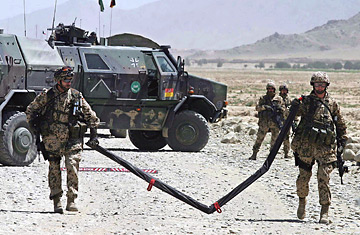
German soldiers of NATO's International Security Assistance Force (ISAF) arriving at the site of a bomb blast on the outskirts of Kabul, Afghanistan.
The tone of the recent letter from the U.S. Secretary of Defense Robert Gates to the German government urging Germany to pony up more troops for the NATO campaign in southern Afghanistan was "stern," according to a German government spokesman. Unnamed Berlin officials were quoted in the German press calling it an "outrage" and even, in one case, an "impertinence." Nonsense, retorted a U.S. official, speaking on condition of anonymity this week: "It was a request by one member of the alliance to another: It was not a demand." Maybe so, but the chilly reception to the missive augurs poorly for Washington's new campaign to persuade allies to dispatch more troops to volatile parts of southern Afghanistan.
That effort tops the agenda at Thursday's meeting of NATO defense ministers in the Lithuanian capital Vilnius, just as it will at a major summit of NATO heads of government in Bucharest in April. Some U.S. officials are billing that meeting as a make-or-break effort for the future not just of the Afghanistan operation but of the Atlantic Alliance.
In Washington, London and Brussels, concerns are growing about deteriorating conditions on the ground in Afghanistan. The usual bickering over the Alliance's perennial problem that some countries do less than their fair share is threatening to break out into a fresh round of transatlantic mud-slinging. "We have made no secret about it that there are certain allies that are in much more dangerous parts of the country, " U.S. Secretary of State Condoleezza Rice said this week. And we believe very strongly there ought to be a sharing of that burden throughout the Alliance." NATO currently has about 40,000 troops in the country, but its officials say it needs another 7,500, especially in the south.
Behind the new urgency in Washington and Brussels are apparent gains made by the Taliban in Afghanistan. In the last year, the Taliban launched 140 suicide bombings, the most since the group was thrown out of power in 2001. Attacks with mines and IEDs, or improvised explosive devices, increased 69% over the same period, according to NATO. Opium production is on the rise. An independent study co-chaired by retired U.S. Marine Corps Gen. James Jones and former U.S. Ambassador to the U.N. Thomas Pickering warned that a failure by the Administration of George W. Bush to obtain more international support — together with other shortfalls — could help Afghanistan become a failed state and a "forgotten war."
Part of the problem that NATO is experiencing are so-called "caveats," or restrictions that member states have placed on where and how their troops can serve in Afghanistan. When Germany approved its mission, for example, the Bundestag stipulated that German soldiers could not be sent to the volatile southern part of the country. Most of Germany's 3,200 troops are, as a result, deployed in the more stable north. NATO troops in the south, including British, Dutch and Canadian forces, have taken correspondingly more casualties. Canada has lost 78 soldiers since arriving in 2002. Most of the 42 British losses have been in the south.
Those casualties are taking a toll at home. Canadian Prime Minister Stephen Harper warned last month that Canada would pull its 2,500 troops out of Afghanistan altogether by early next year if allies do not agree to send more troops to the embattled Kandahar province, which stretched Canadian troops now on patrol. "Kandahar is the center of the Taliban insurgency," he told reporters in Ottawa last month. "If NATO cannot put all the necessary troops and equipment in Kandahar province, I don't think it's ultimately going to do it anywhere."
There are scant signs, though, that it will. Gates' letter to Germany specifically requested up to 1,000 troops for the south together with helicopters. Within 24 hours, Germany responded with a simple rejection, although it will be sending another 250 rapid reaction troops to the north. Neither party in Germany's current ruling grand coalition government wants to stick its neck out on the unpopular proposal in the runup to elections next year. France is considering the request but any decision to dispatch more troops will likely be tied to a greater role in strategic decision-making. Other countries such as Italy and Spain have also been approached, but they aren't aren't responding with the alacrity NATO feels is called for in its biggest and most dangerous deployment ever.
The recalcitrance is partly political. "After Iraq, after Abu Ghraib, after Guantanamo, it is very, very difficult for Germans to agree to put their troops under U.S. command, " says Henning Riecke, a security specialist at the German Council on Foreign Relations in Berlin who advocates sending more German troops to Afghanistan. "Most Germans don't like the U.S. way of doing war." Germany, like many European countries, is also arguing that more emphasis be placed on reconstruction and less on combat, although some acknowledge that the two are not always separable. There has to be a peace to keep.
Those differences may help explain why Secretary Gates' letter, intended for official eyes only, was leaked to newspapers in Germany and widely characterized as another typical example of U.S. bullying. Describing the letter, which has not been made public, in harsh terms may have been an attempt by reluctant German officials to sabotage the appeal before it got off the ground, analysts say. With the Bush Administration as unpopular as ever, and public opinion set strongly against the idea (some 80% of Germans say they do not want to see their soldiers in combat) opposing even reasonable requests from Washington is still the easier course to take.
